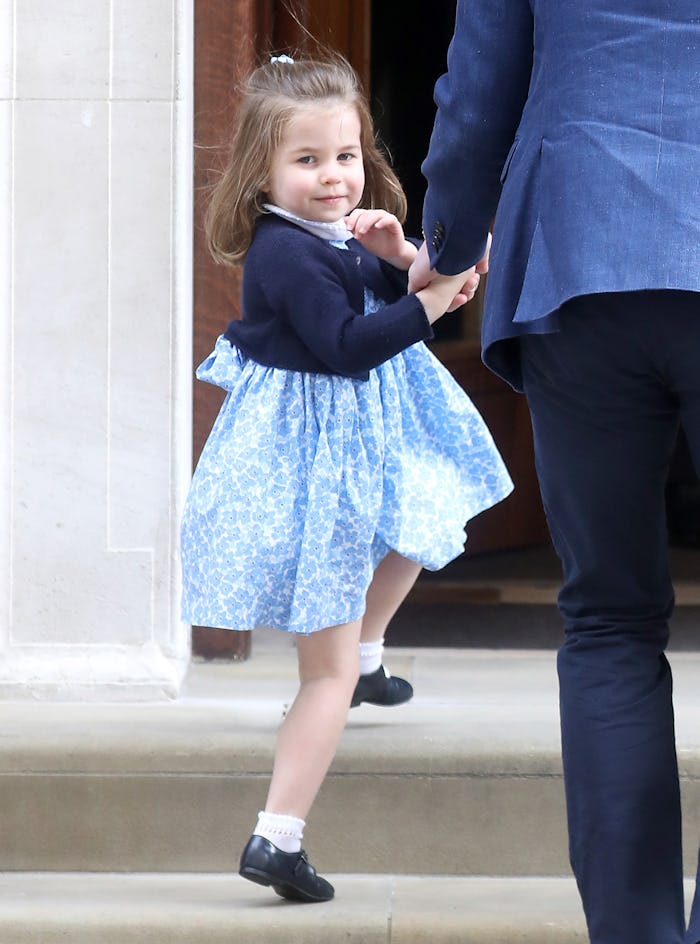Life

7 Facts About Middle Children That Prove They're The Royals Of The Family
The Duke and Duchess of Cambridge, Prince William and Kate Middleton, welcomed their third child, a son, on April 23 at 11:01 a.m. London time. In other words, Princess Charlotte is now a big sister and a middle child. You might wonder if she — or your own middle child — is doomed to become resentful and jealous, like the stereotype claims. Can being a middle child actually determine who you are or who you become? Researchers have long tried to separate the myths from the facts about middle children, and their results might surprise you.
Fortunately for Princess Charlotte, and middle children everywhere, research shows that despite their reputation as lonely and jealous, middle children are owners of more than a few incredible traits. As Insider reports, theories about so-called middle-child syndrome — feeling simultaneously second-best to your older sibling and replaced by your younger sibling — have been around since doctor and psychotherapist Alfred Adler started researching birth order in the 1930s. However, as psychologist Dr. Laurie Zelinger, PhD, told Insider, those feelings of resentment and replacement are not a given. Not surprisingly, how you parent your middle child influences how they grow and develop. So, as Katrin Schumann, author of The Secret Power of Middle Children, tells Psychology Today, middle children can become friendly, innovative team-players once they are adults because of, and not in spite of, their unique experiences growing up in families with both older and younger siblings.
If you have a middle child, or if you are a middle child, you should definitely not overlook what science actually has to say about this particular birth order. So with that in mind, read on for some facts that may or may not challenge your pre-conceived notions about the true princes and princesses of the family: middle children.
They're Great BFFs
As Psychologist Catherine Salmon, PhD explained to Business Insider, middle children are surprisingly social people and are able to get along with pretty much anyone. Salmon notes that they will also do just about anything for their friends. On the downside, this tendency might actually make them too cooperative, and willing to do things that, well, break the rules.
They Take Risks
It makes total sense that if middle kids go unnoticed by their parents, they might be more inclined to take risks — like jumping off the top of the monkey bars — to gain some attention. As Schumann tells Psychology Today, a willingness to take risks can actually make middle children great at business or willing to fight for social justice.
They Hate Conflict
As Schumann explains to Psychology Today, middle children absolutely hate conflict, which might create problems for them when they are older, specifically at work and in relationships. But, as Frank Sulloway, PhD explains to Reader's Digest, a middle child's desire to avoid fights — and experience being in the middle of them — might actually make them great negotiators and problem-solvers, too.
They Need Self-Esteem Support
As Zellinger explains to Insider, your middle child might need a confidence boost every once in a while. This is especially true when their older brother or sister seems to be better at everything and, as a result, they feel second best. Schumann adds that having a lower self-esteem than a first or last-born child might not be a bad thing, though, because it means they are less likely to think the world revolves around them.
They're Team Players
As Reader's Digest reports, one study published in the Journal of Genetic Psychology showed that middle children work better in groups than children born first or last. This makes sense, because they have always had a sibling with whom they have had to share. Schumann explains to Psychology Today that, as adults, middle kids are both natural team players and also fairly independent, which makes them great co-workers.
They Grow Up To Be Free-Range Parents
Schumann tells Psychology Today that her parenting study found that middle children often become really laid-back parents. This might be due to wanting to let their kids have the independence they experienced as children, or a desire to be lax about rules and structure.
Their Birth Order Might Not Mean A Thing About Their Personality
In the end, birth order might not matter as much as we think. As Zellinger explains to Insider, the way we, as parents, talk about birth order and treat our middle children probably matters way more than when they were actually born. So, it seems that middle child syndrome might be a parent-fulfilled prophecy of sorts, especially when it comes to who a kid becomes and how they see themselves in the world.
She adds that the key to raising a happy middle child is trying not to treat them differently than their older sibling and younger siblings, allowing them to develop their own interests, and responding to their unique needs, which sounds like a good plan no matter where your child falls in birth order.
Check out Romper's new video series, Bearing The Motherload, where disagreeing parents from different sides of an issue sit down with a mediator and talk about how to support (and not judge) each other’s parenting perspectives. New episodes air Mondays on Facebook.